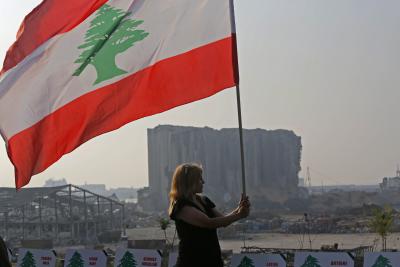Lebanon needs plan for long-term recovery: UN deputy chief
By IANS | Published: August 5, 2021 10:51 AM2021-08-05T10:51:05+5:302021-08-05T11:00:07+5:30
United Nations, Aug 5 UN Deputy Secretary-General Amina Mohammed has called for arrangements for a long-term recovery in ...

Lebanon needs plan for long-term recovery: UN deputy chief
United Nations, Aug 5 UN Deputy Secretary-General Amina Mohammed has called for arrangements for a long-term recovery in Lebanon as the country is still struggling from the aftermath of the Port of Beirut blasts last year.
On Wednesday marked the first anniversary of the blasts on August 4, 2020 which killed 214 people and wounded over 6,000 others, reports Xinhua news agency
Addressing an international conference in support of the Lebanese people, co-hosted by France and the UN, Mohammed said that 12-month emergency response plan articulates collective priority responses to the critical humanitarian needs of the most vulnerable people in Lebanon.
But emergency efforts alone will not solve the crisis, she added.
"We must help lay the foundations for longer-term recovery, anchored in the 2030 Agenda for Sustainable Development," she said.
A strong, inclusive, and comprehensive social protection system is needed to ensure the most vulnerable are able to survive the crisis. This is crucial to positioning Lebanon on a path of inclusive growth, decent employment, and social stability, according to the Deputy Secretary-General.
"We need an enabling environment to move the needle. Ultimately, Lebanon needs an empowered government poised to rapidly implement the necessary reforms. This includes macroeconomic-fiscal reform, the promotion of accountability and transparency, legislation to ensure the independence of the judiciary and to root out corruption and regulate public procurement."
She pledged that the UN will continue to stand with Lebanon and support the country's recovery toward sustainable development.
Lebanon is in the throes of one of the worst crises in its recent history. The economy is in freefall, institutions are struggling, basic services are collapsing, society is fracturing, and the population is in dire need, said Mohammed.
The people of Lebanon have endured nearly a year without a government, she said, adding that they deserve strong institutions that can deliver relief, justice and redress, and a government of national interests that can pursue an ambitious course for reforms and restore stability, growth and the prospects for a democratic future that provides opportunities and taps into the full potential of Lebanon's young women and men.
Over half of Lebanese people now live in poverty.
One in three Lebanese suffers from food insecurity. Nearly 4 million people are at risk of not accessing safe water.
Hundreds of thousands of children are at risk of dropping out of school. Unemployment is on the rise. People are struggling every day with inflation and acute shortages of fuel, electricity, medicines, and water, she noted.
Increasingly, Lebanese families and migrants, alongside Syrian and Palestine refugees, find themselves in need of direct emergency assistance just to meet basic needs.
Meanwhile, the Covid-19 pandemic continues to strain Lebanon's health sector and heavily impact the economy, she said.
Disclaimer: This post has been auto-published from an agency feed without any modifications to the text and has not been reviewed by an editor
Open in app